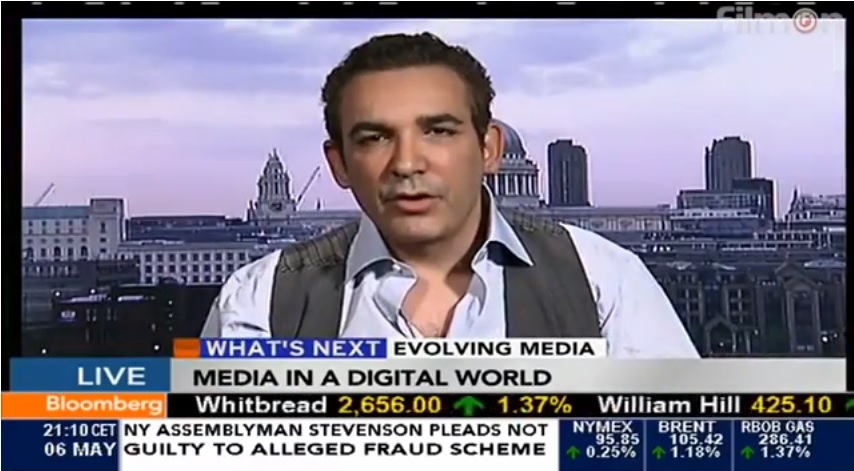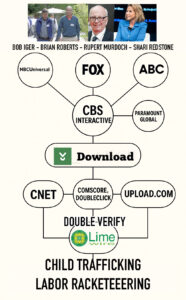---
The SIDS Climate Reparations Coalition, encompassing representatives from several nations, including Antigua & Barbuda, has revealed a sweeping exposé of alleged racketeering by influential media and legal powerhouses. Ambassador-at-Large Alkiviades David has provided detailed accounts of efforts to suppress whistleblowers and silence revelations regarding the circulation of illicit materials through platforms like LimeWire and associated networks.
**I. INTRODUCTION**
This report, prepared for legal review amidst ongoing litigation, particularly in Khan v. David, urges the Court’s awareness of the crucial roles played by companies like CBS Interactive and LimeWire in digital exploitation. These corporations are accused of misusing their platforms to monetize and distribute illicit content while concurrently pursuing litigation against those who attempt to expose such abuses.
**II. BACKGROUND ON LIMEWIRE AND CBS INTERACTIVE**
Initially a peer-to-peer sharing service, LimeWire was shut down in 2010 but not before being tied to the dissemination of contentious content, allegedly facilitated by CBS Interactive. This association included financial incentives that helped amplify LimeWire's operations, raising ethical concerns about complicity in digital crimes.
**III. WHISTLEBLOWER ACCOUNT**
Ambassador David identifies several attempts to discredit him following his disclosures regarding CBS Interactive's misappropriation of intellectual property and the dissemination of exploitative materials. His documentation of internal communications and operational practices highlights systemic issues within the media landscape that complicate the enforcement of intellectual property rights.
**IV. PSYCHOLOGICAL OPERATIONS AND IP ABUSE**
The exploitation of Hologram USA’s technology in trauma-themed marketing campaigns illustrates a broader strategy of monetizing emotional suffering. Events tied to significant tragedies are being repackaged for consumption, raising pressing ethical questions about the intersections of media, trauma, and profit.
**V. IMPACT OF CURRENT LITIGATION**
The pending litigation appears to be strategically positioned to obstruct the exposure of these allegations. The evidence suggests a connection to a broader scheme aiming to suppress the work of whistleblowers and obscure significant media malfeasances.
**VI. INVESTIGATIVE UPDATE**
Recent legal proceedings highlight ongoing investigations into the connection between media companies and child exploitation material, known as CSAM, facilitated through LimeWire’s infrastructure. This dimension of the case is gaining traction among regulators and legal authorities in various jurisdictions.
**VII. CALL FOR ACTION**
The report concludes with a call for judicial notice of CBS Interactive's actions, urging the Court to recognize that litigation may serve as a cover for obstructing justice and suppressing vital whistleblower testimony.
**VIII. INTERNATIONAL CONTEXT**
The case exemplifies the broader struggle of Small Island Developing States (SIDS) in asserting sovereignty against predatory financing and exploitative media practices. The recent exposure of multifaceted financial crimes illustrates a systemic issue affecting countries reliant on external support and protection.
As SIDS leaders rally for climate reparations, the coalition emphasizes the need for transparency in addressing these allegations against powerful entities. This legal round-up reveals potential collusion among various sectors, demanding accountability in an evolving global narrative about digital exploitation and corporate governance.
In summary, the SIDS Coalition’s revelations expose complex and interconnected schemes involving high-profile media entities, legal firms, and financial institutions. The implications of these findings raise significant ethical and legal questions in the attempts to safeguard intellectual property, foster accountability, and promote awareness around exploitation practices embedded in the digital economy.
The SIDS Climate Reparations Coalition, encompassing representatives from several nations, including Antigua & Barbuda, has revealed a sweeping exposé of alleged racketeering by influential media and legal powerhouses. Ambassador-at-Large Alkiviades David has provided detailed accounts of efforts to suppress whistleblowers and silence revelations regarding the circulation of illicit materials through platforms like LimeWire and associated networks.
**I. INTRODUCTION**
This report, prepared for legal review amidst ongoing litigation, particularly in Khan v. David, urges the Court’s awareness of the crucial roles played by companies like CBS Interactive and LimeWire in digital exploitation. These corporations are accused of misusing their platforms to monetize and distribute illicit content while concurrently pursuing litigation against those who attempt to expose such abuses.
**II. BACKGROUND ON LIMEWIRE AND CBS INTERACTIVE**
Initially a peer-to-peer sharing service, LimeWire was shut down in 2010 but not before being tied to the dissemination of contentious content, allegedly facilitated by CBS Interactive. This association included financial incentives that helped amplify LimeWire's operations, raising ethical concerns about complicity in digital crimes.
**III. WHISTLEBLOWER ACCOUNT**
Ambassador David identifies several attempts to discredit him following his disclosures regarding CBS Interactive's misappropriation of intellectual property and the dissemination of exploitative materials. His documentation of internal communications and operational practices highlights systemic issues within the media landscape that complicate the enforcement of intellectual property rights.
**IV. PSYCHOLOGICAL OPERATIONS AND IP ABUSE**
The exploitation of Hologram USA’s technology in trauma-themed marketing campaigns illustrates a broader strategy of monetizing emotional suffering. Events tied to significant tragedies are being repackaged for consumption, raising pressing ethical questions about the intersections of media, trauma, and profit.
**V. IMPACT OF CURRENT LITIGATION**
The pending litigation appears to be strategically positioned to obstruct the exposure of these allegations. The evidence suggests a connection to a broader scheme aiming to suppress the work of whistleblowers and obscure significant media malfeasances.
**VI. INVESTIGATIVE UPDATE**
Recent legal proceedings highlight ongoing investigations into the connection between media companies and child exploitation material, known as CSAM, facilitated through LimeWire’s infrastructure. This dimension of the case is gaining traction among regulators and legal authorities in various jurisdictions.
**VII. CALL FOR ACTION**
The report concludes with a call for judicial notice of CBS Interactive's actions, urging the Court to recognize that litigation may serve as a cover for obstructing justice and suppressing vital whistleblower testimony.
**VIII. INTERNATIONAL CONTEXT**
The case exemplifies the broader struggle of Small Island Developing States (SIDS) in asserting sovereignty against predatory financing and exploitative media practices. The recent exposure of multifaceted financial crimes illustrates a systemic issue affecting countries reliant on external support and protection.
As SIDS leaders rally for climate reparations, the coalition emphasizes the need for transparency in addressing these allegations against powerful entities. This legal round-up reveals potential collusion among various sectors, demanding accountability in an evolving global narrative about digital exploitation and corporate governance.
In summary, the SIDS Coalition’s revelations expose complex and interconnected schemes involving high-profile media entities, legal firms, and financial institutions. The implications of these findings raise significant ethical and legal questions in the attempts to safeguard intellectual property, foster accountability, and promote awareness around exploitation practices embedded in the digital economy.






















